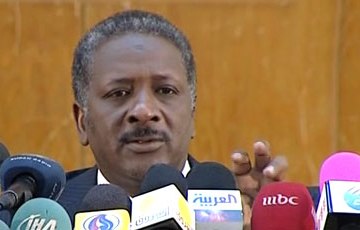Sudan’s finance minister defends austerity measures, says more to follow
January 6, 2011 (KHARTOUM) – The Sudanese minister of finance and national economy Ali Mahmood on Thursday said that the austerity package passed by parliament yesterday represents a third of the required measures needed to bring the economy back on its feet.

He stressed that these measures should have taken place a long time ago but were avoided for reasons he did not detail.
Among the changes that went into effect was an increase to the price of petroleum products which is subsidized by the government.
These included gasoline (from 6.5 Sudanese pounds per gallon to 8.5); diesel (from 4.5 Sudanese pounds per gallon to 6.5); cooking gas (from 12 Sudanese pounds to 13); jet fuel (from 4.5 Sudanese pounds per gallon to 6.5).
The government also announced that the price of sugar will be raised by 20 Sudanese pounds per 50 kilogram (110 pounds) bag.
Furthermore, a 25% cut in salary for 149 ministerial-level government officials and a 30 percent reduction in foreign travel for the government were introduced.
But the Sudanese minister said that even if compensation for government officials were removed altogether it would not make a difference and blamed the soaring budget deficit on expansion of consumption as well as the improper use of subsidies which led to smuggling of petroleum products to neighboring countries where prices are higher.
He even claimed that Darfur rebels fighting the central government since 2003 are using subsidized fuel because of its low price compared to other places.
Mahmood revealed that new policies will be drafted with regard to foreign workers to curb smuggling but did not elaborate.
Analysts say years of overspending and oil dependency have caught up with Khartoum. Foreign investment has slowed because of the global financial crisis and a soaring import bill has caused inflation to rise and foreign exchange shortages.
A study done by economic consultancy UNICONS showed that between 75%-80% of Sudan’s budget is spent on security and defence, even after a 2005 north-south peace deal.
“We will stop all subsidies gradually,” Mahmood said. Sudan only subsidizes petroleum products and sugar.
He said subsidies on petroleum products cost 6 billion Sudanese pounds a year and the sugar subsidy was creating a huge import bill.
“Keeping subsidies in this area makes no sense,” Mahmoud said. Two government finance officials told Reuters the removal of subsidies would likely be done in three stages with a second stage maybe in March/April, depending on how well the population absorbed the initial move.
Sugar is a strategic commodity in Sudan which produces around 750,000 tonnes of sugar a year, while consuming around 1.1 million tonnes.
Agriculture Minister Abdel Haleem al-Mutaa’fi admitted agriculture would take a direct hit. Sudan’s irrigation pumps use diesel and the government has said it could take up to three years to convert them all to cheaper electricity. Some 65% of Sudan’s 40 million people are farmers.
“We have given $150 million in cash to an agriculture fund which also has a $100 million line of credit with the Islamic Development Bank,” Mutaa’fi told Reuters. “An industry fund has been given $100 million,” he added.
The government will ban certain imports to stop outflow of hard currency such as bottled water, fresh meat, paint, flour products, dairy products (except powder milk) and animal products.
Sudan’s Central Bank Governor Sabir Al-Hassan said that if any delay in enforcing these measures would have it more difficult to fix the economic problems.
“There is disequibirum in supply and demand and there are structural imbalances due to low productivity” he said before noting that there is complete coordination with the finance ministry in the coming period to monitor the situation.
In a related development, Sudanese president Omer Hassan Al-Bashir ordered that the government workers should receive half their pay on the 15th as oppsed to the end of month payment so that they get accustomed to pricing changes.
Sudan produces some 500,000 barrels per day of oil, but only 100,000-110,000 bpd are from wells in the north. The economy is dependent on oil for some 45 percent of its budget and most of its foreign currency revenues.
Under a 2005 peace agreement ending a 22-year civil war, Africa’s longest conflict, southern Sudanese will vote from January 9-15 to determine whether to secede or to remain united with the north.
The country’s breakup is widely predicted but the north has promised to accept the outcome of the vote and tamped down fears of renewed conflict.
(ST)
